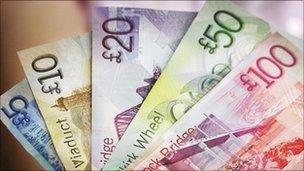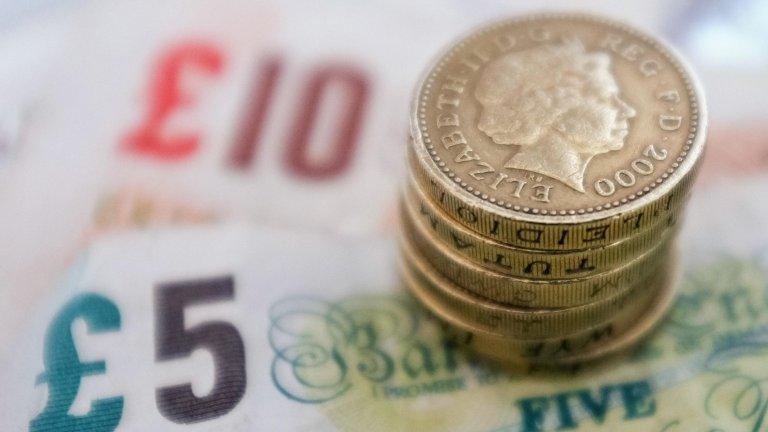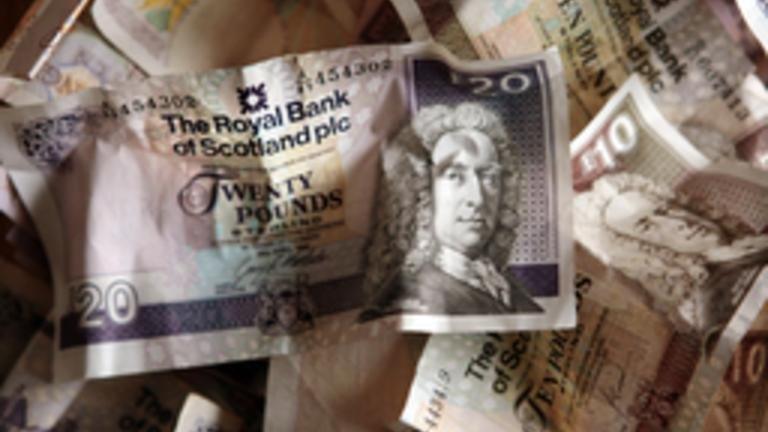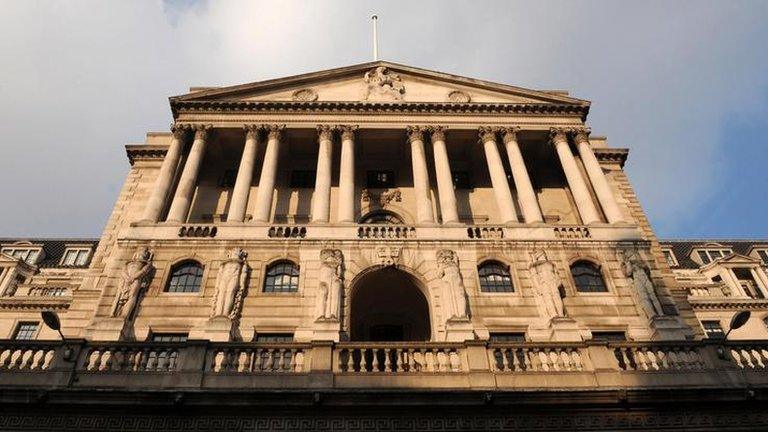Scottish Independence: Take Note
- Published

The UK Treasury is questioning the continuation of Scottish bank notes, in the event of independence
My wallet currently contains pictures of Sir Walter Scott, the Forth Bridge, Culzean Castle and the Glenfinnan Viaduct.
One of the banknotes has been signed by the Royal Bank of Scotland's Stephen Hester: others by Lord Dennis Stevenson. These date back to 2007 when Bank of Scotland, which he then chaired, was splurging high risk loans around the economy like a game of financial paintball.
So these notes carry reminders of recent financial calamity. But how much do they carry the nation's identity? Put another way, how much does it matter to Scots that we have our own banknotes?
The campaign to keep Scotland within the UK is banking on it mattering quite a bit, judging by the spin on this morning's morsel from a forthcoming Treasury paper on currency questions surrounding independence.
It's claimed these are symbols of the "strength and flexibility of the union", and a hint that even if they are retained post-independence, they may become less convertible into readies signed off by the Bank of England's chief cashier.
Treasury firepower
The Treasury paper's got quite a build-up; speeches from Treasury Secretary Danny Alexander last Thursday, pro-union campaign chairman Alistair Darling on Friday, and with a George Osborne/Danny Alexander jointly-authored article running in the Sunday papers.
Publication is scheduled for Tuesday. It's being promoted as providing new analysis as firepower to sustain attacks on one of the fronts which we're told is playing most favourably for the 'Better Together' campaign.
The question of whether Scotland retains distinctive banknotes is largely a symbolic one, pointing to the possibility, and the irony, that Scotland could gain its independence, but at a price including the loss of Sir Walter Scott's coupon on a tenner.
There ought to be meatier arguments than that in the Treasury paper. It's the other parts of the price that will get the focus when we see the whole document.
And it will take the Treasury into the politically risky territory of imagining its own role after a 'Yes' vote. You can safely assume it's not going to sound particularly helpful or co-operative in negotiating a currency pact, or at least not without exacting some big concessions and compromises on flexibility around Scottish deficits, debt and borrowing from the Holyrood negotiating team.
You can also assume the SNP and pro-independence side will want to explain the reasons why the rest of the UK should want an independent Scotland inside the currency tent.
Deputy First Minister Nicola Sturgeon argued last week that sterling "belongs to Scotland" as much as other parts of the UK, just as it is argues the Bank of England does, and that a currency union is merely "common sense".
She challenged the Treasury to negotiate ahead of time, saying it has refused to do so because it doesn't want to concede it's in Westminster's interests to do a currency deal. Yet in a way, the opening position of that negotiation is precisely what she's getting this week.
Credibility
Both sides of the debate are hampered by divisions. The SNP has shifted from a strongly pro-euro argument to, at least as strongly, a pro-sterling one, and while it appears united around the newer position, there is privately expressed concern that this has left the party exposed to the kind of attacks it's getting this week.
It is also having its message weakened by former senior Nationalists, independent economists and its Scottish Green allies arguing that it should keep open the option of a separate Scottish currency. As I've argued before, there's a logic to that, but it's a very hard sell politically.
Meanwhile, the pro-union side faces divisions that will only intensify as the electoral cycle turns towards fighting the 2015 election.
It's not particularly helpful to the constitutional cause for Alistair Darling to be on Sky News at the weekend warning of the uncertain, unpredictable nature of Britain's current economic predicament.
And in attacking his successor's problems in getting either growth going or the deficit falling, Mr Darling added: "At the moment, nothing he (George Osborne) says has got much credibility".
The other front opening up in recent days is Labour's attempt to find an alternative offer it can put to referendum voters on what changes it might make to enhance devolved powers within the UK, particularly tax powers.
That stage had to come, and it's an important development in this debate. Just as the nationalist proposition can be put under pressure, it opens up the main pro-union party to counter-attacks on the technical complexities and compromises it faces within devolution. That's if Labour can agree on what it wants to do with devolved powers, and that's far from guaranteed.
- Published21 April 2013

- Published2 April 2013

- Published21 February 2013
